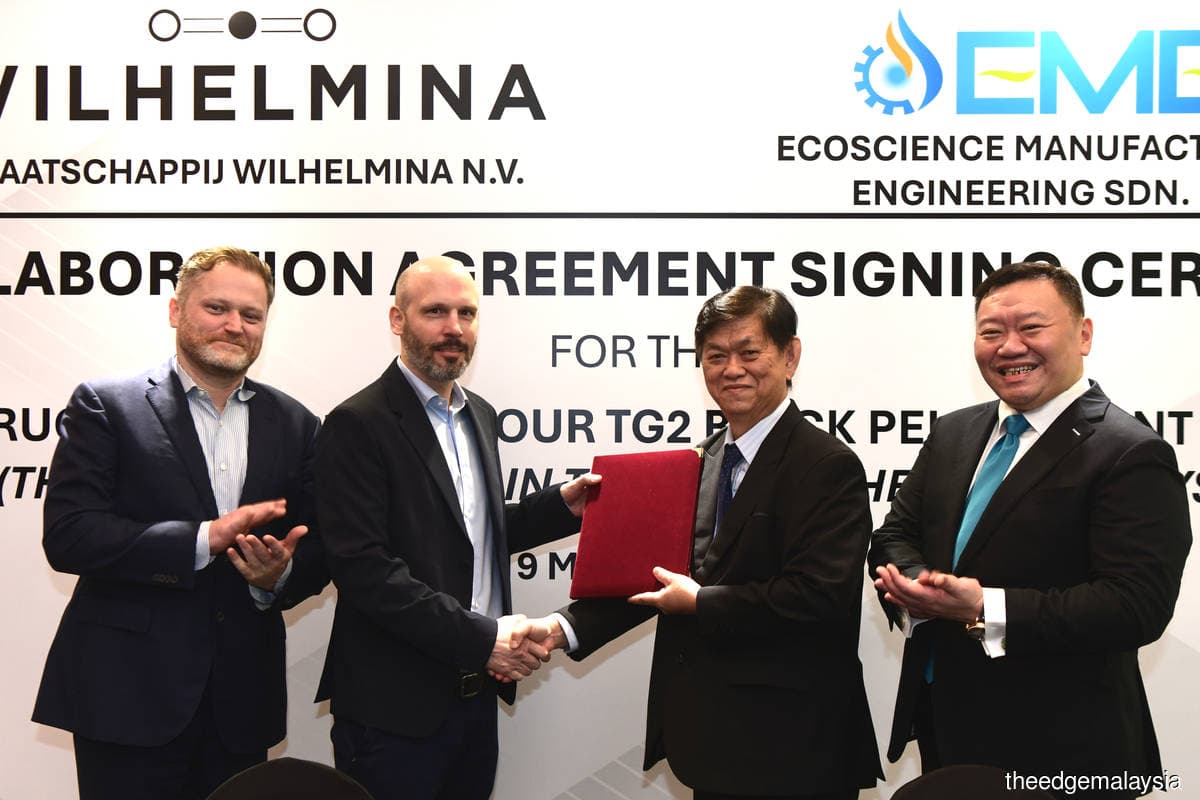
KUALA LUMPUR (March 19): Integrated palm oil milling services provider Ecoscience International Bhd is partnering with Netherland renewable energy firm Maatschappij Wilhelmina NV (Wilhelmina), to build and manage Wilhelmina’s TG2 black pellet plant in Kuantan, Pahang.
The investment in the plant is estimated at US$60 million (RM283.65 million), said Wilhelmina co-founder cum chief executive officer Barthold Van Doorn after the signing ceremony for the agreement on Tuesday.
Under the collaboration agreement, Wilhelmina shall finance, own and operate the TG2 black pellet plant. Ecoscience, as the contractor, is to undertake the engineering, procurement and construction (EPC) work for the plant.
Both parties shall execute a definitive EPC and master manufacturing agreement, which is expected by the fourth quarter of 2024.
The plant is located in Phase 3 of the Gebeng Industrial Area, and the construction is expected to kick-start by the fourth quarter. The plant's capacity is about 120,000 tonnes of black pellets per annum.
The plant converts agricultural waste such as empty fruit bunches (EFB) into TG2 black pellets, which is a drop-in-coal replacement fuel.
Upon commissioning of the plant, there will be operations and maintenance of the plant, which Wilhelmina shall outsource to Ecoscience to operate, maintain and manage the TG2 black pellet plant on behalf of Wilhelmina.
“Besides taking on the EPC role, we are expected to also operate, maintain and manage the plant for Wilhelmina upon commissioning. All in all, the plant is expected to give our order book a significant boost, as well as provide consistent recurring income to our group in the future,” said Ecoscience managing director Wong Choi Ong.
Meanwhile, Van Doorn said the investment in Malaysia is only the first step in the group’s overall strategic expansion plan.
“We have earmarked a number of locations in both Malaysia and in Southeast Asia to establish more TG2 black pellet plants that will also use other agricultural wastes, such as coconut husks and rubber tree wood as feedstock,” he said.
Van Doorn sees tremendous opportunities in generating renewable and carbon-neutral energy through recycling industrial agricultural waste streams.
“In fact, this TG2 black pellet, which will use EFB as feedstock, will be the first of its kind in the world. As the second largest producer of palm oil globally, we understand Malaysia generates some 20 million tons of EFB waste a year. Instead of being left to decay or filling up landfills, these can be transformed into a clean and high-energy coal replacement that could reduce as much as 12 million tons of methane, equivalent to 300 million tons of CO2. This can certainly contribute towards the Malaysian government's target of becoming a carbon-neutral nation by 2050,” he added.
Wilhelmina is a renewable energy company, with its principal business activities in converting agricultural waste streams into sustainable energy in the form of TG2 black pellets.
At Tuesday's noon market break, Ecoscience’ share price was traded unchanged at 41.5 sen, bringing the stock a market capitalisation of RM155 million. The stock has gained 43% from 29 sen on March 11.
